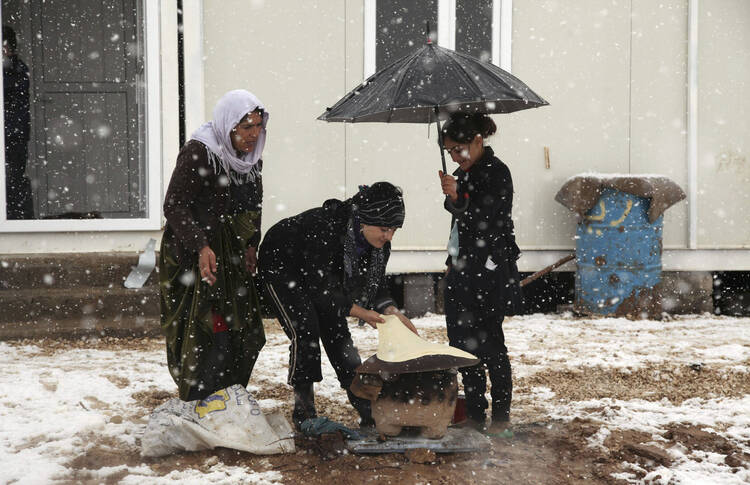Three U.S. Dominican sisters visiting displaced Christians in Iraqi Kurdistan encountered a witness of service and deep faith.
They had traveled to Iraq on a mission of solidarity with the Iraqi Dominicans, who are among the more than 100,000 Christians uprooted from their homes last summer by the advances of Islamic State militants.
Now the displaced sisters are administering to the tens of thousands still homeless, mostly dwelling in tents, half-finished buildings and containers in Iraqi Kurdistan.
The three Americans -- Sisters Marcelline Koch of Springfield, Illinois; Durstyne "Dusty" Farna of Adrian, Michigan; and Arlene Flaherty of Blauvelt, New York -- spoke to Catholic News Service via Skype from Iraq before completing their Jan. 5-15 visit to Irbil and Dohuk, which are hosting most of the internally displaced Iraqis.
They recalled "very, very sad faces"; small, metal housing units almost as cold as meat freezers; two to three families crammed into single rooms; and, because of sporadic electricity, an eerie, dangerous darkness enveloping interiors of chilly concrete buildings housing the displaced.
"It's cold for us, and we come from real cold climates," said Sister Dusty, as she calls herself.
"I'm still trying to get my head around what it means to have lost your home, your culture, a place to belong, your community -- everything," said Sister Marcelline. "That sense of loss is just huge. And being here has helped me to feel that much more."
Christians from Qaraqosh, for example, came from what would be considered the upper middle class by American standards. They were educated professionals -- doctors, lawyers, business owners -- who lived in very large homes.
"They have nothing anymore, they absolutely lost everything," said Sister Dusty.
Adding to the unrelenting misery are humiliating reminders for the families of what they had to abandon.
Contents of their homes are even being sold at "robber's markets" near their dwellings in Kurdistan. A displaced man from Qaraqosh received a menacing "business" call on his cell phone: "I'm standing here in the middle of your store. What do you think about that? I'm selling your things."
"This is obviously not a sustainable situation," Sister Arlene said of the crisis in the Kurdistan, adding that the displaced face "a very unknown future."
The sisters said they heard the same sentiment expressed in different ways from the people they met: "This is not our home, this is not our place. We want to go home."
Yet they don't know if they can ever go back to their homes. It seems there is not the capacity to protect their cities and villages, the sisters said, and anyplace that the Islamic State has left, it has booby-trapped with mines.
The stability of the Kurdistan region is also unclear.
"ISIS is not far from here" the sisters said, noting that on Jan. 10 the Islamic State was about 25 miles southwest of their location.
Meanwhile, tens of thousands of displaced children are still not getting an education. The Iraqi sisters would like to establish a school for the displaced. They are prepared educationally and professionally to do that, the U.S. Dominican sisters stressed -- they just need the financial support.
The U.S. sisters called their mission "I Have Family in Iraq."
It's a reflection of the close relationship they have had with their Iraqi counterparts since 1999 when the first delegation of U.S. Dominicans traveled to Iraq, Sister Arlene among them. Since then, nine of the Iraqi sisters have lived among the U.S. Dominicans; four of them have received advanced degrees.
"Our purpose in coming here was to be in solidarity with our sisters. There is that peace for them to know there are others who care about them," said Sister Marcelline. But their visit has also personally enriched their vocation and their faith.
Even though the Iraqi sisters were uprooted and suffer from the losses of what happened to their families, their friends, their church and their ministries, they are still a witness of the church, the U.S. sisters stressed.
"I am learning a lot more about what it means to be sister by just watching them," Sister Arlene said.
"You know, what is inspiring is the people's faith," Sister Dusty said, her voice cracking with emotion. "Their life centers around their faith, not their things."
"Their faith is so deep. They have no (prayer) books in front of them. They know it by heart. Usually the expression 'know it by heart' means only memory. But when I say by heart, I mean they are praying from the depths of their heart," Sister Dusty recounted of the Masses the three sisters attended with the displaced, and vespers with their Dominican counterparts. "This is what is helping them to survive. And this is what inspires us, is this incredible deep faith. You can see this is central to who they are. This is their life."
The American sisters' outreach of solidarity and love for the displaced Iraqis is just the first step in their mission. Throughout their visit they listened, watched and took notes in preparation for their advocacy efforts when they return home. They also had a meeting at the U.S. consulate in Irbil.
"We plan to really raise the awareness of the American people about the situation of displacement of these IDPs (internally displaced persons) in Iraq, the crisis unfolding here and the conditions in which they are living," said Sister Arlene. "We will appeal to our government to do everything they can to address this crisis more systematically, to resource it as well as possible and to look at motivating the central governments of Iraq to take responsibility for their own people here."
"We'd like to make an appeal to all Christians in the world to pray for them and to find ways how they might participate in the humanitarian efforts," Sister Dusty said.








